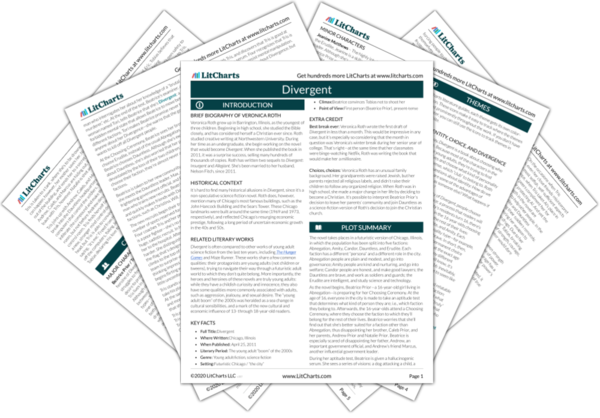Summary
Analysis
Soldiers take Tobias and Tris to see Jeanine. Jeanine tells them that she’s always suspected that Tris and Tobias could be Divergent. Jeanine suspects that Tobias is more strongly allied with Abnegation, even though he’s chosen Dauntless. This combination allowed Tobias to avoid mind control.
Here, Jeanine gives most of the details about Tobias’s Divergence (something Tobias himself had previously denied to Tris). Tobias, much like Tris, wavers between Abnegation and Dauntless—in other words, between bravery and selflessness (which may be similar things, as we’ve seen). As Roth sees is, freedom comes from the “marriage” of these two states of mind: people who are brave and selfless can think for themselves instead of imitating factions.
Themes
Jeanine goes on to explain her plan to Tobias and Tris. She knows that she needs an army of loyal soldiers in order to seize control over the city, so she’s made a deal with the Dauntless leaders: Dauntless soldiers in return for good jobs in the new Erudite government. Jeanine plans to use her new government to purge the city of the factionless, thus bringing prosperity to everyone.
Jeanine proceeds to explain her “evil plan” to Tris and Tobias—just like a super-villain in a James Bond movie. As in any Bond flick, Jeanine feels confident giving away the details of her plan because she’s sure that Tris and Tobias are going to die soon.
Themes
Jeanine suggests that Tobias should be thanking her for shooting the people of Abnegation, since Tobias hated his own father, an Abnegation leader. Tobias denies that he supports Jeanine’s plan at all. Jeanine shrugs, and Tris realizes that Jeanine is the most evil kind of person there is: she’s not emotional in the slightest; rather, she treats Abnegation or the factionless as mere “problems” to be solved, albeit with cold-blooded murder.
Throughout the book, Tris has tried to figure out what kind of person she wants to be. Sometimes, she’s been cold and emotionless, and sometimes kinder and warmer. Here, Tris comes to realize that there’s nothing admirable about pure strength or a lack of compassion. Jeanine exemplifies both, and so is the most dangerous kind of villain there is.
Themes
Jeanine tells Tobias that scientists will use his Divergence to develop a new drug that can control the Divergent, of which there are probably many among Abnegation. Tris, on the other hand, will be executed as soon as possible. Furious, Tobias tries to attack Jeanine, but before he can do any damage, soldiers pull him away. Jeanine orders soldiers to take Tobias and Tris away. Tris bites the hand of one of the soldiers pulling her out of the room. The soldier hits her on the head, knocking her out.
The situation seems pretty dire for Tobias and Tris, and appropriately, Roth ends the chapter with a “cliffhanger.” It’s important to note that many Abnegation people are Divergent: there’s something about selflessness and modesty that makes people more likely to be free-thinking and open-minded, and thus immune to the usual factions of society.
Themes
Get the entire Divergent LitChart as a printable PDF.













